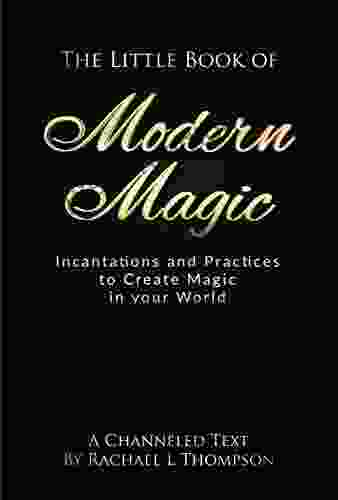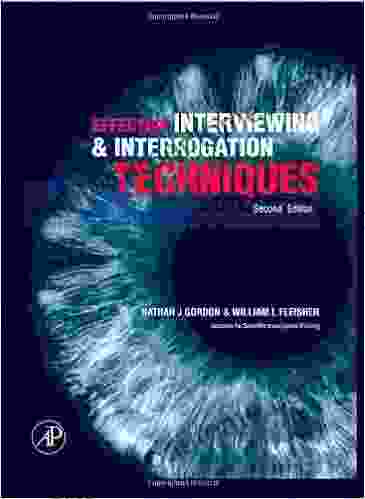Unlocking the Secrets of Effective Interviewing and Interrogation Techniques: A Comprehensive Guide

The ability to effectively conduct interviews and interrogations is a critical skill for professionals in various fields, including law enforcement, intelligence, and journalism. Effective interviewing techniques enable individuals to gather accurate information, detect deception, and persuade others to cooperate. This article provides a comprehensive overview of proven interviewing and interrogation techniques, empowering readers to become skilled interviewers and interrogators.
4.7 out of 5
| Language | : | English |
| File size | : | 3975 KB |
| Text-to-Speech | : | Enabled |
| Print length | : | 312 pages |
Understanding the Interviewing Process
Before delving into interrogation techniques, it is essential to understand the principles of effective interviewing.
1. Preparation:
Prior to an interview, gather as much information as possible about the subject and the case. This includes reviewing documents, understanding the purpose of the interview, and formulating a clear list of questions.
2. Establishing Rapport:
Create a comfortable and non-threatening atmosphere by building rapport with the subject. Use active listening skills, show empathy, and avoid interrupting.
3. Open-Ended Questions:
Start with open-ended questions that allow the subject to provide detailed responses. Ask questions that begin with "what," "how," and "when."
4. Closed-Ended Questions:
Use closed-ended questions to clarify specific details or gather factual information. These questions have limited response options, such as "yes/no" or "true/false."
5. Nonverbal Cues:
Pay close attention to the subject's nonverbal behavior, including body language, eye contact, and facial expressions. These cues can provide valuable insights into their emotional state and credibility.
Interrogation Techniques for Information Gathering
When the goal is to gather information, a variety of interrogation techniques can be employed.
1. The Reid Technique:
This highly structured technique involves a nine-step process that begins with establishing rapport and ends with a statement of confession. It is designed to elicit truthful responses and detect deception.
2. The PEACE Model:
The PEACE Model emphasizes establishing a cooperative environment. It focuses on empathy, active listening, non-judgmental communication, and the use of open-ended questions.
3. The Cognitive Interview Technique:
This technique involves a structured approach to memory retrieval. It utilizes cognitive frameworks to aid the subject in recalling events and details effectively.
Interrogation Techniques for Deception Detection
Detecting deception is a crucial aspect of interrogation. Several techniques can assist in identifying and countering deceptive behavior.
1. Baseline Analysis:
Establish a baseline of the subject's normal behavior and communication patterns. This will help identify deviations that may indicate deception.
2. Behavioral Analysis:
Observe the subject's nonverbal cues, such as changes in eye contact, fidgeting, or increased perspiration. These cues can be indicative of anxiety or discomfort.
3. The Polygraph Test:
A polygraph test measures physiological responses, such as heart rate, blood pressure, and breathing patterns, to determine deception. However, it is important to note that polygraph tests are not universally accepted as reliable.
Persuasion Techniques for Cooperation
In certain situations, it may be necessary to persuade the subject to cooperate and provide information. Several persuasion techniques can be effective.
1. The Foot-in-the-Door Technique:
Start with a small request that the subject is likely to agree to. Once they have committed to this small request, they are more likely to comply with a larger request.
2. The Door-in-the-Face Technique:
Present an extreme request that the subject is unlikely to agree to. Once they have rejected this request, a more moderate request seems more reasonable and acceptable.
3. The Low-Ball Technique:
Initially offer a highly attractive deal to the subject. Once they have committed to it, gradually introduce hidden costs or conditions that make the deal less appealing. This can increase the subject's commitment to the agreement.
Ethical Considerations
It is imperative to adhere to ethical principles when conducting interviews and interrogations.
1. Truthfulness and Accuracy:
Ensure that all information obtained is accurate and truthful. Avoid using deceptive tactics or coercion to elicit responses.
2. Consent and Confidentiality:
Respect the subject's right to informed consent and confidentiality. Obtain consent before recording or sharing any information.
3. Dignity and Respect:
Treat the subject with dignity and respect, regardless of their status or the nature of the investigation. Avoid physical or psychological abuse.
Effective interviewing and interrogation techniques are essential tools for professionals in various fields. By understanding the principles of interviewing and employing proven techniques for information gathering, deception detection, and persuasion, individuals can enhance their ability to extract accurate information, build cooperation, and advance their investigations. However, it is crucial to adhere to ethical principles and maintain the integrity of the interview process. As you delve deeper into the art of interviewing and interrogation, remember to approach each encounter with a commitment to truth, respect, and the pursuit of justice.
4.7 out of 5
| Language | : | English |
| File size | : | 3975 KB |
| Text-to-Speech | : | Enabled |
| Print length | : | 312 pages |
Do you want to contribute by writing guest posts on this blog?
Please contact us and send us a resume of previous articles that you have written.
 Book
Book Novel
Novel Page
Page Chapter
Chapter Text
Text Story
Story Genre
Genre Reader
Reader Library
Library Paperback
Paperback E-book
E-book Magazine
Magazine Newspaper
Newspaper Paragraph
Paragraph Sentence
Sentence Bookmark
Bookmark Shelf
Shelf Glossary
Glossary Bibliography
Bibliography Foreword
Foreword Preface
Preface Synopsis
Synopsis Annotation
Annotation Footnote
Footnote Manuscript
Manuscript Scroll
Scroll Codex
Codex Tome
Tome Bestseller
Bestseller Classics
Classics Library card
Library card Narrative
Narrative Biography
Biography Autobiography
Autobiography Memoir
Memoir Reference
Reference Encyclopedia
Encyclopedia Nathan Busenitz
Nathan Busenitz Michele O Mara
Michele O Mara Nicholas Baer
Nicholas Baer Roger Gill
Roger Gill Peter Gibbons
Peter Gibbons Will Hobbs
Will Hobbs Paul Aertker
Paul Aertker Myquillyn Smith
Myquillyn Smith Roger Luckhurst
Roger Luckhurst Religion Scholar Kate Crosby
Religion Scholar Kate Crosby Zachary M Schrag
Zachary M Schrag Samone Bos
Samone Bos Mixerman
Mixerman Nancy Sakaduski
Nancy Sakaduski Michael J Williams
Michael J Williams Peter Delpeut
Peter Delpeut Mitri Raheb
Mitri Raheb Nelson L Schuman
Nelson L Schuman Timothy Moss
Timothy Moss Wen Qin Wang
Wen Qin Wang
Light bulbAdvertise smarter! Our strategic ad space ensures maximum exposure. Reserve your spot today!

 Allen ParkerSince GIS Inherits Ideas and Thoughts Before Used to Create Printed Maps It...
Allen ParkerSince GIS Inherits Ideas and Thoughts Before Used to Create Printed Maps It...
 Junichiro TanizakiIncantations And Practices For Creating Magic In Your World: Channeled Text
Junichiro TanizakiIncantations And Practices For Creating Magic In Your World: Channeled Text Frank ButlerFollow ·5k
Frank ButlerFollow ·5k Ignacio HayesFollow ·16.3k
Ignacio HayesFollow ·16.3k Kelly BlairFollow ·15.4k
Kelly BlairFollow ·15.4k Chance FosterFollow ·9.6k
Chance FosterFollow ·9.6k Greg FosterFollow ·12.3k
Greg FosterFollow ·12.3k Jonathan HayesFollow ·16.2k
Jonathan HayesFollow ·16.2k Manuel ButlerFollow ·4.6k
Manuel ButlerFollow ·4.6k Howard PowellFollow ·13.3k
Howard PowellFollow ·13.3k

 Samuel Beckett
Samuel BeckettPortrait of the Plague Doctor: A Chilling Tale of Fear...
Prologue: A...

 Elliott Carter
Elliott CarterTrends in Modeling and Simulation Studies in...
Unveiling the Convergence of...

 Natsume Sōseki
Natsume SōsekiCells For Kids: Science For Children
Unlock the Microscopic...

 Anthony Wells
Anthony WellsUnlock the Power of Understanding: Embrace the African...
Embark on a Journey of Truth,...

 Forrest Reed
Forrest ReedBreaking Free: Healing from Toxic Relationships Between...
Are you struggling...
4.7 out of 5
| Language | : | English |
| File size | : | 3975 KB |
| Text-to-Speech | : | Enabled |
| Print length | : | 312 pages |










